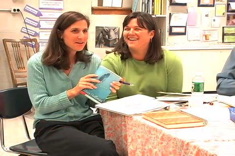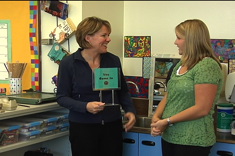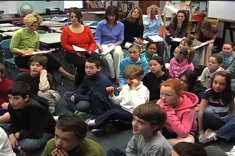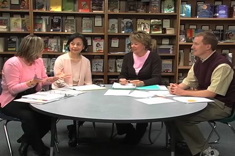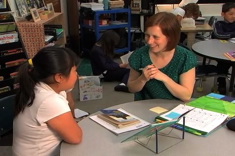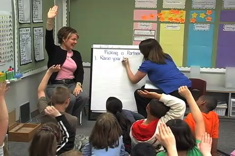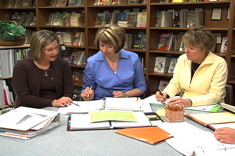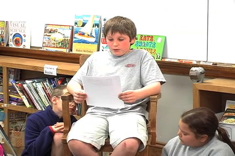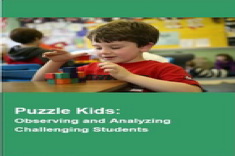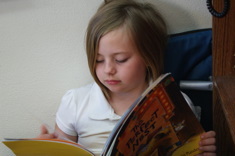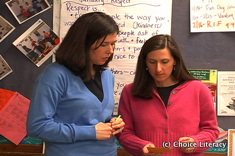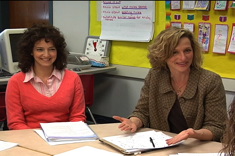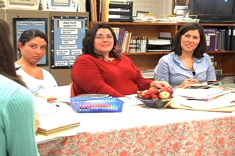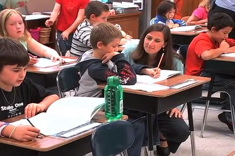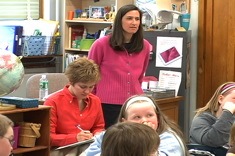Literacy Coaches
A simple question - who will coach the coaches? If you're a literacy coach, you already know there is no job more amazing or overwhelming in a school. Our Choice Literacy library includes a small sample of our resources for literacy coaches. If you work as a coach, you'll want a subscription that includes access to our Leaders Lounge, where there are over 900 resources for coaches, including study group protocols, videos of demonstration lessons, and guides for designing coaching cycles.
Latest Content
How Study Groups Are Like Self-Cleaning Ovens
With a few key elements in place, Brenda Power and Jennifer Allen explain how study groups can almost run themselves and get everyone involved.
The Language of Coaching Part II: The Leading Edge
Jan Miller-Burkins explores the “how” of shifting language so that it is less judgemental in discussions with colleagues.
Got Space?
Jennifer Allen gets creative with space for displays in her literacy coaching work.
Two or Three Things I Know for Sure: A Teacher Workshop Activity
"Two or Three Things I Know for Sure" is a terrific short workshop activity for study groups or faculty meetings, and it also can be used in partnership discussions with mentors, literacy coaches, and colleagues. The activity gets everyone to explore their bedrock beliefs about teaching – as well as what it takes to change them.
Demonstration Lesson: Inferring Character Traits
In this demonstration lesson from a 5th grade classroom, Clare Landrigan leads students through a reading and discussion of inference and character development.
Solving Problems Quote Collection
If you need reminders that every problem is an opportunity, check out this stellar quote collection.
Grade Level Team Meeting: Test Preparation
In this video of a 3rd grade team meeting, literacy coaches Janet Scott and Gail Boushey help third-grade teachers think through what is going well with test preparation, and what might be adapted before the tests begin in a few weeks.
Books That Touch the Heart
Is it ever alright for a teacher to cry when reading aloud? Shari Frost and her colleagues select their favorite tearjerker read alouds, and what they’ve learned from sharing them with students.
Picking a Partner: Demonstration Lesson and Debrief
In this demonstration lesson from a K-2 classroom, Joan Moser leads students through guided practice in picking a partner.
Chatting About Coaching Collaboration
Gail Boushey and Janet Scott discuss how they collaborate as coaches, sharing strategies and common goals across the classrooms they work in.
Coaching in Kindergarten: Conferring
What’s in a name? For kindergartner Maria, it’s the start of learning how letters and sounds work. In this coaching session, Joan Moser of “The Sisters” helps Daniel understand how to use a child’s name as a beginning point for teaching letters and sounds.
Literacy Chats: An Open Discussion Format
Literacy coach Pam Hahlen discusses the value and format of monthly “literacy chats” for teachers.
Case Studies in Professional Learning Communities
In this brief video, Literacy Coach Pam Hahlen and Principal Karen Szymusiak meet with two teachers in a professional learning community group to discuss ongoing case studies.
Collaborative Team Meeting: Assessing and Planning Together
Gail Boushey leads a collaborative planning meeting between 4th grade teachers, literacy coaches, and the principal early in the year.
Quick Take: Protocols for Teacher Study Groups
In this three-minute Quick Take video, Clare Landrigan describes the teacher study group protocol she uses to foster shared understanding and allow for differentiated learning among teachers.
From Compliments to Naming the Craft: Fifth-Grade Writing Workshop Share Session
This whole-class share session in Lesley Fowler’s fifth-grade classroom is the culmination of a nonfiction writing unit. Over the course of the year, students have moved from complimenting their classmates during these share sessions to writing down specific aspects of the piece they enjoyed or had questions about during the reading.
Conferring Notebook for Coaches
Gail Boushey shares the simplicity of her coaching notebook.
Puzzle Kids: Observing and Analyzing Challenging Students (E-GUIDE)
This E-Guide provides teachers with a tool to analyze children who need additional observation and analysis to create successful learning opportunities.
The Dog Ate My Study Group Plans! Four Instant (and Fun and Reflective) No-Prep Teacher Workshops (E-GUIDE)
This e-guide provides tried-and-true workshops plans for educators in need of energy and encouragement.
Time for Reading
Shari Frost describes how literacy coaches shadowed children to get a sense of how much reading students were doing.
Night Terrors: Let the Coaching Begin!
Jennifer Allen realizes how much we miss if we wait till the start of the school year to begin mentoring colleagues. When she helps new teacher Jess deal with nightmares about the first day of school, she discovers some big themes they will be mulling together all year long.
Assessment and Curriculum Mapping
In this video from a new teacher study group for grades 3-5 teachers, Jennifer Allen demonstrates how teachers can use assessment data to develop instructional plans for individual students and create curriculum maps for an entire class of students.
Four Essentials in Designing Professional Development for Literacy Leaders
While clever activities for adult professional development are fun, what really helps colleagues become more competent and sensitive to classroom and school needs? Franki Sibberson knows what her colleagues need and gives it to them.
Teacher Study Group: Writing Focus
In this video of a teacher study group, Jennifer Allen leads a group of grades 3-5 teachers as they launch their monthly meeting in October.
Charting the Course: A Yearlong Professional Development Plan for New Teachers (SCHEDULE)
Planning with the end in mind is essential for literacy leaders. Jennifer Allen takes us through her process for creating a focused and progressive year-long plan.
Literacy Room for Teachers Tour
In this four-minute video tour, Jennifer Allen describes how she arranges and displays materials in the “Literacy Room,” the space that has become invaluable in supporting teachers’ professional development in literacy instruction.
The Curricular Support Menu: A Collaborative Tool for Assisting Colleagues
This support menu is a fun way for literacy coaches to survey teachers for support requests.
Word Choice Lesson: A Collaborative Coaching Session with a New Teacher
Jennifer Allen collaborates with a new teacher, Jessica, early in the fall to teach a lesson in Jessica’s 4th grade classroom.
Reflective Observation: Helping Teachers Observe, Analyze, and Guide (TEMPLATE)
This template helps teachers focus their classroom observations.
Three Little Phrases No Literacy Coach Can Live Without
Brenda Power shares trade secret phrases for communicating with colleagues.
Browse Content By
Type
Category
- Assessment Tools
- Big Fresh Archives
- Booklists
- Choice Numeracy
- Classroom Design
- Common Core
- Community Building
- Conferring
- Content Literacy
- Digital Literacy
- English Language Learners
- Equity
- Family Relations
- Free Samples
- Guiding Groups
- Leadership
- Literacy Coaches
- Mentor Texts
- Minilessons
- New Teacher Mentors
- Podcasts
- Poetry
- Quote Collections
- Reading Strategies
- Self Care
- Struggling and Striving Learners
- Talking and Listening
- Teacher Study Groups
- Teaching Reading
- Teaching Writing
- Word Study and Vocabulary
Author
- Melissa Quimby
- Nawal Qarooni
- Gwen Blumberg
- Julie Cox
- The Lead Learners
- Hannah Tills
- Josie Stewart
- Ruth Metcalfe
- Mallory Messenger
- Becca Burk
- Jodie Bailey
- Vivian Chen
- Mary Brower
- Tiffany Abbott Fuller
- Stephanie Affinito
- Ruth Ayres
- Leigh Anne Eck
- Heather Fisher
- Shari Frost
- Julie Johnson
- Suzy Kaback
- Gigi McAllister
- Shirl McPhillips
- Melanie Meehan
- Cathy Mere
- Debbie Miller
- Tara Barnett and Kate Mills
- Tammy Mulligan
- Dana Murphy
- Bitsy Parks
- David Pittman
- Brenda Power
- Heather Rader
- Matt Renwick
- Mandy Robek
- Christy Rush-Levine
- Gretchen Schroeder
- Jen Schwanke
- Brian Sepe
- Katherine Sokolowski
- Stella Villalba
- Jennifer Vincent
Grade Level
Choice Literacy Membership
Articles
Get full access to all Choice Literacy article content
Videos
Get full access to all Choice Literacy video content
Courses
Access Choice Literacy course curriculum and training

